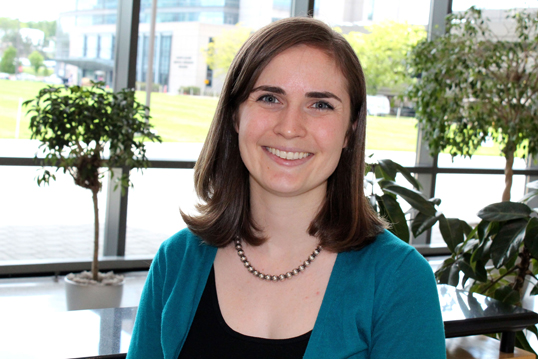
Second-year medical student Molly Cook has been chosen as one of 14 Boston Schweitzer Fellows and will spend the next year teaching teens about intimate relationship violence.
Second-year medical student Molly Cook has been chosen as one of 14 Boston Schweitzer Fellows and will spend the next year teaching teens about intimate relationship violence.
“These Schweitzer Fellows are living Dr. Albert Schweitzer’s legacy of reverence for life,” said Sylvia Stevens-Edouard, executive director of the Albert Schweitzer Fellowship. “Their fellowship year will leave them well-prepared to successfully face the challenges of serving vulnerable and underserved populations, whose health and medical needs are many and varied.”
The Centers for Disease Control defines teen dating violence as “the physical, sexual, or psychological/emotional violence within a dating relationship, as well as stalking” and reports that it is on the rise, citing a 2011 national survey in which 9.4 percent of high school students report being hit, slapped or physically hurt on purpose by their boyfriend or girlfriend in the 12 months prior to the survey. Cook hopes to intervene at an early enough age that teens can recognize red flags, make informed decisions to keep them safe and be aware of the resources available to them to get help if they need it.
“Teens will be provided with resources and asked to complete safety plans, empowering them to assess current relationships and be aware of the steps to take if they choose to end an unhealthy relationship,” said Cook. “Ultimately, this project aims to heighten awareness of dating violence during the formative teenage years in hopes of decreasing the prevalence of intimate partner violence.”
Beginning this summer, Cook will present workshops at a number of community organizations that serve youth populations, including Pernet Family Health Services, African Community Education, Shrewsbury Youth and Family Services, Y.O.U. Inc. and Whitin Community Center. The three one-hour workshops, which will be tailored to different needs of youths ranging in age from 10 to 19, will cover aspects of healthy and unhealthy relationships, tips on helping a friend who is in an unhealthy dating relationship and the evaluation of the effect of the media on perceptions of gender and relationship dynamics.
Workshop participants will be asked to complete a survey prior to the workshop to assess their knowledge of and attitudes about relationships and potential unsafe situations, and will be given the same assessment at the end of the workshop to measure the effectiveness of the teaching.
After the summer, Cook will fine tune the workshops based on the assessments and continue to offer them throughout the academic year. She also hopes to incorporate what she learns from the Schweitzer Fellowship into her capstone project and may focus on how clinicians can learn to talk with teens about violence in intimate relationships.
“A unique item on the survey asks the teens to suggest a question that a health care provider could ask that would make them feel comfortable talking about an intimate relationship problem or red flag,” said Cook. As a future physician, she hopes to incorporate what she learns into her own practice.
In addition to the stipend provided by the Albert Schweitzer Fellowship, Cook is using funds from an Arnold P. Gold Foundation Summer Student Fellowship to defray the cost of developing and presenting the workshops. The Gold Foundation supports projects that are focused on studying cultural competency issues, developing skills to become relationship-centered physicians and addressing a public health need in an underserved community or population.
“I’m grateful for the support from the Albert Schweitzer Fellowship and from the Gold Foundation, and the mentoring support from Dr. Suzanne Cashman [ScD, professor of family medicine & community health] and Dr. Erin Barlow [MD, assistant professor of obstetrics & gynecology and pediatrics] in developing the workshops,” she said.